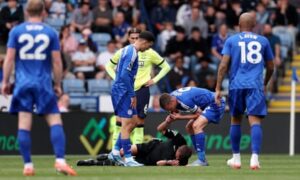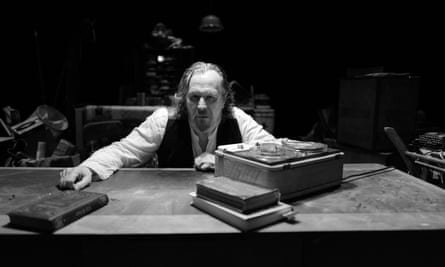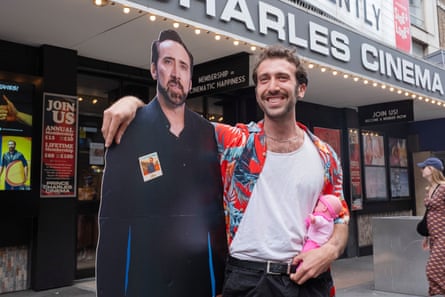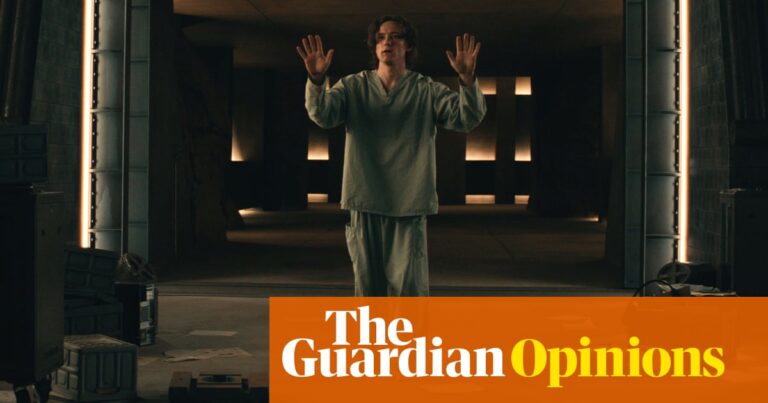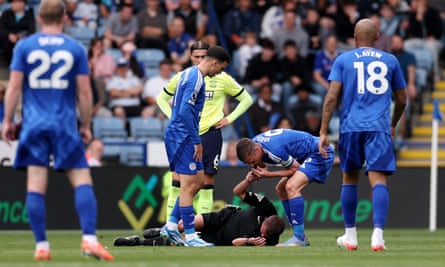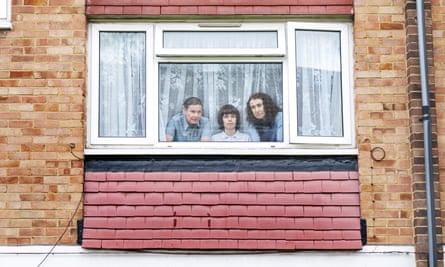It’s the smell that hits you first. One hundred and seventy years of slide grease and valve oil hang pungent in the air. Outside, it’s just another old West Yorkshire building, the sandstone blasted dark by wind, rain and industry. Inside, the walls are lined with certificates and plaques.
I’m in what was once the summer house of textile manufacturer John Foster, in Queensbury, outside Bradford. Foster’s monumental Black Dyke Mills complex is around the corner. Its heavy machinery is long gone, replaced by gyms, kitchen-and-bathroom businesses and a “giant charity warehouse”. But the brass band Foster established here in 1855 is still going strong.
It’s a big year for the Black Dyke Band: they feature prominently in Bradford UK City of Culture 2025 celebrations, playing in its opening ceremony and headlining the Big Brass Blowout this week, billed as “Bradford’s brass legends”. It’s not just hype. They were the band on the Beatles’ Yellow Submarine, they’ve been both Oscar- and Grammy-nominated (the former for Babe: Pig in the City) and they tour all over the world – last year visiting Japan for sell-out dates. They’ve also already earned their place in the finals at the Royal Albert Hall of this year’s hotly contested National Brass Band Championships.
Nick Childs, the band’s musical director, arrives to find me squinting at black and white photos. He points out treasures, from a snap of composer Edward Elgar at a Black Dyke performance in 1921, to a huge earthenware jug commemorating the band’s 19th-century contest wins.
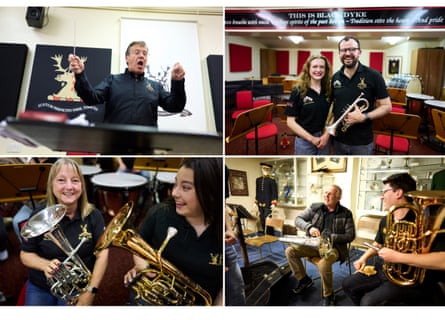
Don’t fall for the sentimentality of that Hovis advert: brass bands came from the tough-love worlds of mills and mining. Childs is Welsh, the son of a leading euphonium player. As teenagers, he and his brother became virtuosos on the same instrument – “the cello of a brass band” – but their father was strict. “He said that before I could go to music college, I had to have a proper job. So I worked down a coal mine for five years.” The industry wasn’t to last much longer. “In 1984 I played with the band that marched out of Grimethorpe Colliery with Arthur Scargill. And I also played with the band that, 30 months later, marched back in and we hadn’t got anything.” He pauses. “That was a tough time.”
How did the bands survive? “The community. Black Dyke is the most successful brass band in the world,” says Childs. “They’ve won more championships than any other. But the lifeblood is concerts – and these are based around your community. When the band are practising, we get people knocking at the door to come in and listen.”
As Childs and I talk the musicians are arriving for the evening’s rehearsal and starting to warm up. Keith Britcliffe has played cornet with Black Dyke for 30 years. When he began, women weren’t able to join. That changed in 1999. “It ruffled a few feathers,” he says. Tenor hornist Alison Childs was the second woman in the band and is its longest-serving female member (she’s also married to Childs – who got the MD job after she joined, he stresses). Presumably it was a pretty macho environment? “Yeah. But I didn’t get any hassle from the band members here,” she adds quickly. “Some of the older players wouldn’t speak to me if they saw me in the street with [band] uniform on” she says. What was that about? “I think it was tradition,” she suggests diplomatically. “All the men from Black Dyke worked in the Black Dyke Mills. So there weren’t any women around.”
Today just over a quarter of the band’s members are female. They include Alison’s daughter Rebecca Childs, a primary school teacher who marvels that her mum’s generation “fought their way and were like, ‘Don’t look at me – listen to me play’.” Alison nods. “I’m glad I carried on being a nuisance,” she giggles. Rebecca has played baritone in Black Dyke for three years. Who taught her? “Who didn’t?! Mum started and then when things got really heated, Dad stepped in. And Uncle Bob! And Dave, my cousin.” Uncle Bob, I realise later, is Robert Childs, another renowned brass band conductor. His son, David Childs, has been described as “the Roger Federer of the euphonium”.
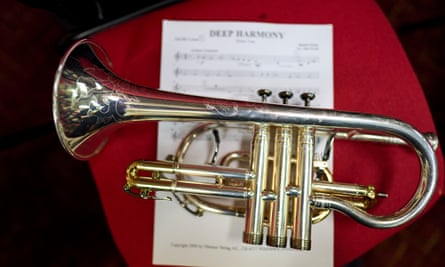
The Childs dynasty is an extreme example, but Black Dyke is full of families. Garry Reed plays trombone and has been in the band for “20-odd years”; his bass trombonist son Adam joined five years ago. He started learning the cornet “at five or six maybe”, worked his way through various band instruments before settling on trombone. “Then a local band rang my dad, and said, ‘we need a bass trombone player. Would your lad do it? It’s in three weeks.’ And he went ‘yeah’.” They both cackle. “So in three weeks I had to learn how to read bass clef and then I had to learn the test piece and then I did my first contest.” How did it go? “We came first!”
Do they see more of each other thanks to Black Dyke? “We also work together,” Adam says sheepishly. Garry runs a plumbing and heating business. How do they fit it all in? “If I didn’t work for myself there’s no way I could do this,” he explains. “I’m very careful what jobs I take on a Monday and Thursday – the evenings we rehearse.”
Fixing leaking pipes is a long way from the Royal Albert Hall stage. “It’s almost like living a double life,” says Adam. Niall Thompson, another cornet player, works for the civil service and tells me that some of the things the band does sound so incredible that he doesn’t tell his colleagues about them. “You don’t want to be going, you know, ‘I was on Pyramid stage at Glastonbury last weekend’ because it sounds absolutely ridiculous.” “It’s like you’re making it up,” agrees his percussionist wife, Logan. She now teaches drums for the same local music service that taught her to play at the age of four.
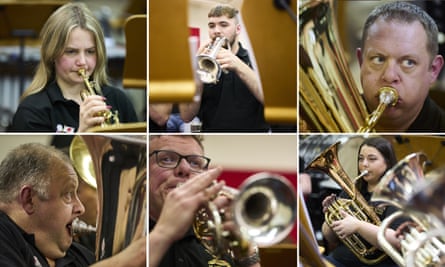
Everyone I speak to has previously played with other bands. How does Black Dyke compare? “It’s just a different level,” Garry grins. “There’s much more focus on the musical side of things,” explains ex-army cornet player Jon Hammond. “The finer details matter. We try for that perfection rather than a good performance.”
That much is obvious in the evening’s rehearsal. The band whizzes through arrangements of Tchaikovsky and Barry Manilow, a new collaborative piece with local bhangra outfit Punjabi Roots Academy, a bit of Delius (“a Bradford boy,” Childs reminds us) and a percussion-driven number by brass band composer Peter Graham. There’s a half-smile on Childs’ face as he conducts. “What dynamic are you, back row?” he checks at one point. The cornets shift in their seats like schoolkids. “Fortissimo,” someone mumbles. “Fortissimo? In your dreams.” The volume on the next run-through is blistering. Praise is understated (“Nothing wrong with that”). So is criticism. “We’ll have a good look at that, please,” he instructs after some coordination problems. “That didn’t sound like us.”
The speed and discipline of rehearsal is astonishing. “It’s really fast-paced,” Jon agrees. “And this is stuff we’re seeing for the very first time.” Childs is demanding with good reason and proven results. “All of my players – whether they’re dog walkers or plumbers or music people – they may be amateurs, but they’re Olympians.”
They’re also playing instruments owned by Black Dyke, which is funded solely by ticket sales, donations and sponsorship. Nothing, though, is more valuable in this world than the time and energy of those unpaid musicians. Their “Olympian” standard was cultivated through early access to free music lessons – and, as several players impress on me, brass bands are now more vital than ever in providing music education. Experienced band members train beginners and less advanced players in a lively ecosystem of junior bands. “We’ve got a lot of brass bands around us,” Becky explains, “which is great, because the community will come in and you can go, ‘it’s OK that you can’t be taught in school. Come down at half seven, we’ll give you an instrument, we’ll give you music, we’ll give you uniform. Don’t you worry about it.’ We’re really lucky.” She smiles sadly. “But we know not all communities have that.”
The Big Brass Blowout is on 11 April; the Black Dyke Band with Richard Hawley is on 12 April; both concerts in St George’s Hall, Bradford
Source: theguardian.com




